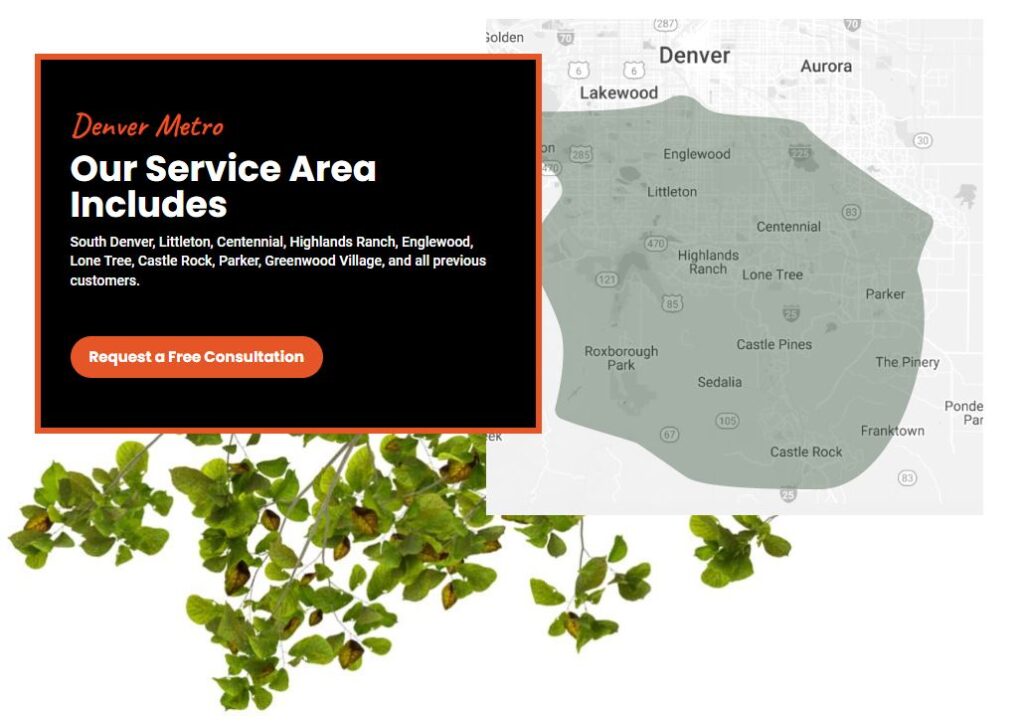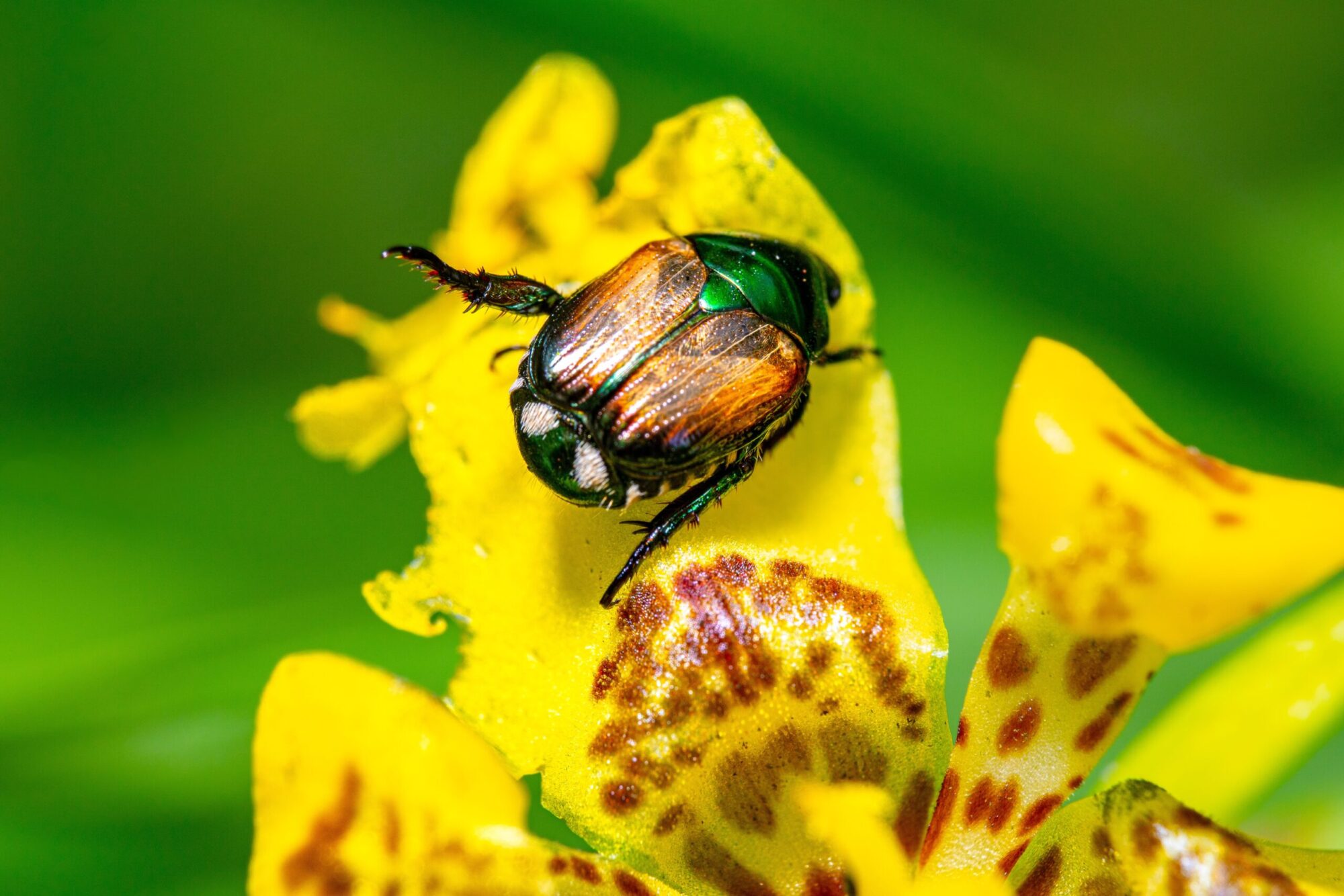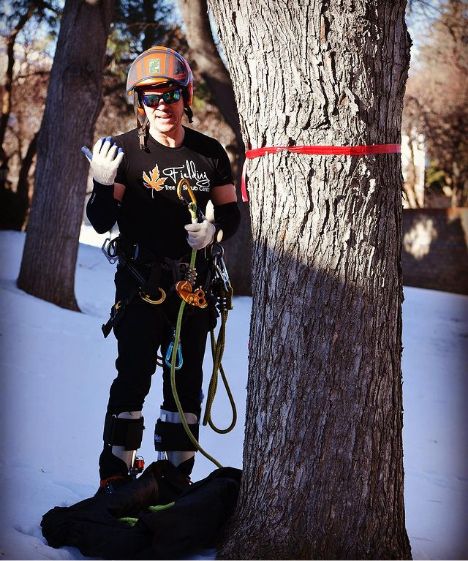Japanese beetles can be a real nuisance for homeowners in Littleton, Colorado, and the surrounding areas. While this article focuses on the Littleton area, it’s important to note that at Fielding Tree Care, our services extend to numerous cities in the Denver metro area. We specialize in effective and safe methods for controlling Japanese beetles and offer our expertise in assessing your property’s terrain and vegetation. Our approach ensures the best strategies for managing these pests. Additionally, while we will focus on Japanese beetle control in this post, we also provide a comprehensive range of tree care services in both Littleton and the other areas we service.
To learn more about the services we provide and where we provide them, please visit the links below:
Understanding Japanese Beetles and Their Impact on Colorado
These small scarab beetles from Japan can wreak havoc on lawns and gardens. Since their arrival in the United States in 1916, Japanese beetles have spread to many regions, including Colorado. They are notorious for their voracious appetite and ability to cause significant damage.
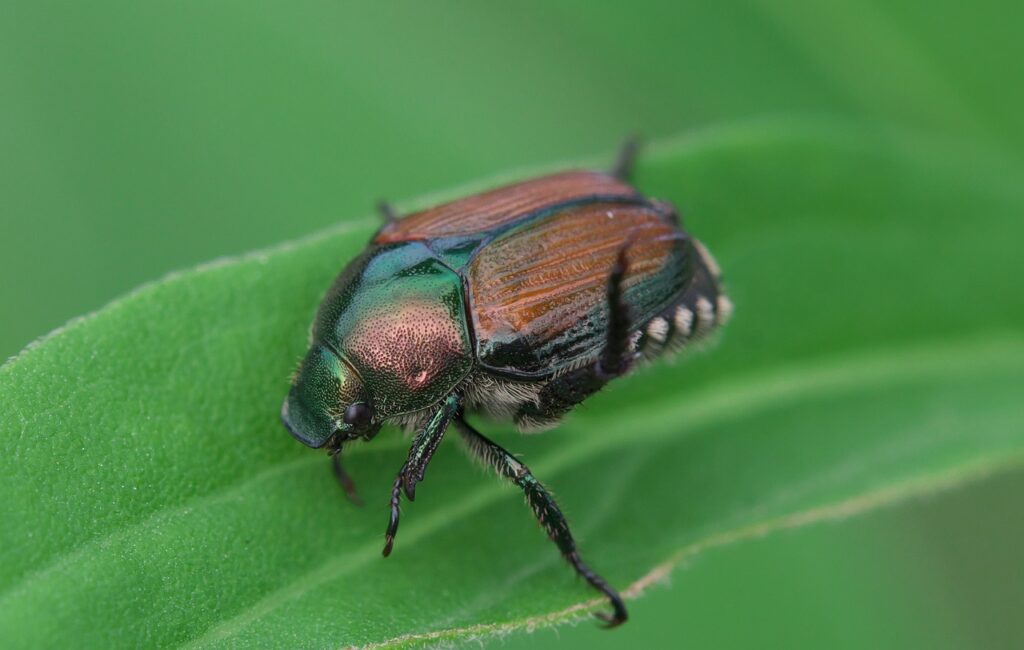
Japanese beetles have a metallic green body with coppery-brown wing covers, making them easily recognizable. Adult beetles typically emerge in early summer and feed on the foliage, flowers, and fruits of various plants. Lawns are the prime target for their larva, but the adults feed on shrubs and flowers which can cause damage to your landscape’s plants.
The impact of Japanese beetles in Colorado can be particularly significant. Their ability to devour plant tissues quickly can lead to defoliation, weakening plants and making them more susceptible to diseases and other pests. Roses, fruit trees, vegetables, and ornamental shrubs are among their favorite targets.
Colorado’s climate, with its warm summers and relatively mild winters, provides an ideal environment for Japanese beetles to thrive. Their attraction to well-irrigated and well-maintained landscapes allows them to find ample food and suitable breeding conditions.
Given their potential for widespread damage, it is essential for Colorado residents to be proactive in managing Japanese beetle populations. Homeowners can take steps to mitigate the impact of these pests by incorporating natural control methods and understanding the specific needs and vulnerabilities of affected plants.
Remember that Japanese beetles are not a problem that can be solved overnight. Ongoing management and a combination of control measures are often necessary to keep their populations in check and minimize the damage they cause.
Assessing Japanese Beetle Damage: Understanding the Threshold
One common concern for homeowners dealing with Japanese beetles is determining the severity of the infestation on their property. Recognizing the threshold between regular damage caused by a few beetles and a full-blown infestation can help homeowners gauge the severity of the problem and take appropriate action.
Level of Damage
Japanese beetles feed on the foliage, flowers, and fruits of plants, resulting in visible damage such as skeletonized leaves or chewed flowers. While this level of damage may be undesirable, it may not pose a significant threat to the overall health of the plant.
Number of Beetles
If you only spot a few Japanese beetles on your plants, it generally indicates a low population density. While these beetles can still cause some localized damage, it might not warrant immediate intervention. However, monitoring the population closely is essential as Japanese beetles release aggregation pheromones, which attract more beetles to the area. If you are consistently seeing groups of 10+ beetles and not just one or two, then the local infestation may be more severe and could cause damage to your plants that they cannot recover from.
Extent of Damage
Assess the extent of damage across your landscape. If you notice widespread defoliation, multiple plants severely affected, or consistent damage over a significant period, it suggests a higher population density and a potential infestation. In such cases, taking action becomes crucial to prevent further damage.
Plant Vulnerability
Some plants are more susceptible to Japanese beetle damage than others. Roses, linden trees, grapes, and fruit trees are among their favorites. If these highly attractive plants on your property show signs of extensive damage despite your efforts to control the beetles, it may indicate a more significant infestation requiring immediate attention.
Impact on Plant Health
Consider the overall health of your landscape. If the presence of Japanese beetles results in stunted growth, declining vigor, or repeated plant stress, it indicates a more severe infestation that could have long-term consequences. Act promptly to protect the health and vitality of your plants.
When assessing the threshold between regular damage and a full-blown infestation, it’s crucial to evaluate the cumulative effect of Japanese beetles on your property. Regular monitoring and observation will help you gauge the severity of the problem and make informed decisions about implementing control measures.
Additionally, it’s important to take your own threshold for tolerating the Japanese beetles on your landscape into consideration. While some property owners may allow regular damage to occur to their plants, trees, and shrubs, others may desire intervention at early signs of damage.
Remember, prevention and early intervention are key. By implementing landscape control methods and seeking professional assistance when necessary, you can effectively manage Japanese beetle populations and minimize their impact on your landscape.
Tips for Japanese Beetle Control
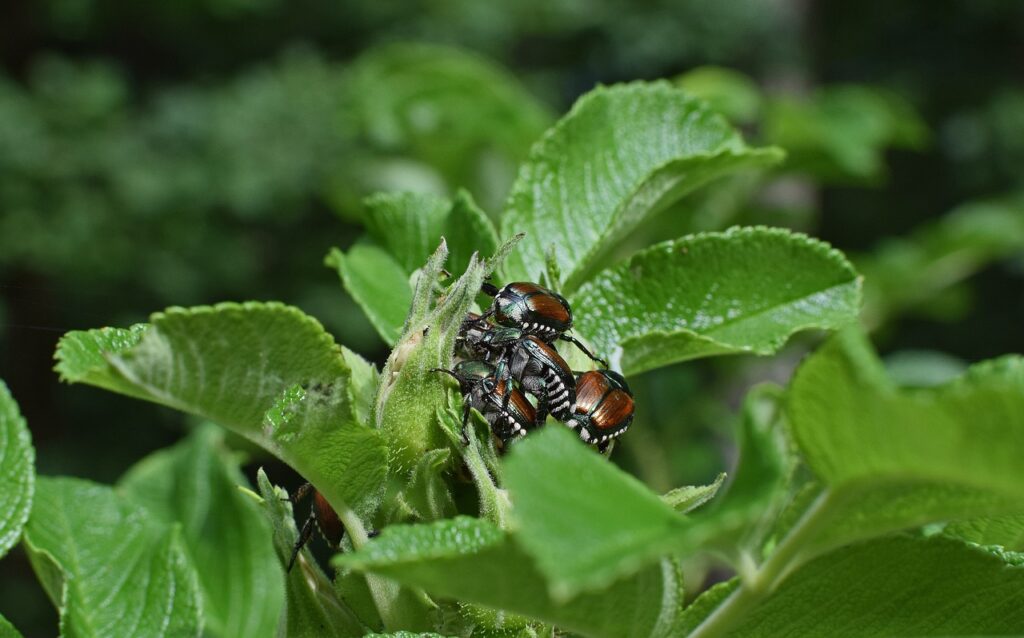 At Fielding Tree Care, we offer expert guidance and effective strategies for Japanese beetle control. Consider the following tips to mitigate the impact of these pests on your trees and plants:
At Fielding Tree Care, we offer expert guidance and effective strategies for Japanese beetle control. Consider the following tips to mitigate the impact of these pests on your trees and plants:
Convert Lawn Areas
Reduce the amount of turf grass, as Japanese beetles prefer grassy environments. Create landscape beds or other ground cover options that are less attractive to them. Select lawn grass varieties that can tolerate less moisture, discouraging Japanese beetle populations.
Plant Resistant Varieties
Choose plants that are less susceptible to Japanese beetle damage. Research from the Colorado State University Extension suggests creating “trapped areas” to lure Japanese beetles away from your most desirable plants.
Here’s a list of resistant and non-resistant plants:
Japanese Beetle-Resistant Plants, Trees, and Shrubs
Consider incorporating the following Japanese beetle-resistant options into your landscape:
- Perennials: Lavender, Catmint, Salvia, Yarrow, Coreopsis.
- Annuals: Marigolds, Zinnias, Cosmos, Snapdragons, Geraniums.
- Trees: Red Maple, Ginkgo, Dogwood, Spruce, Cedar.
- Shrubs: Butterfly Bush, Lilac, Boxwood, Juniper, Arborvitae.
Plants, Trees, and Shrubs That Attract Japanese Beetles
While caution should be exercised when planting these attractor plants, incorporating a few of them away from your main garden can help divert the beetles’ attention:
- Roses
- Grapes
- Linden Trees
- Japanese Maples
- Fruit Trees
- Hibiscus
- Dahlias
- Willows
- Evening Primrose
- Virginia Creeper
Professional Treatment Options for Japanese Beetle Control
Managing Japanese Beetle Infestations
For severe Japanese beetle infestations or professional assistance, it’s recommended to consult Fielding Tree Care. Our experts can assess the situation and provide appropriate treatment options tailored to your needs.
Remember that managing Japanese beetles is an ongoing process. Consider your level of tolerance for Japanese beetle damage and choose treatment options accordingly. Striking a balance between effective control measures and preserving the overall health of your landscape is crucial.
Avoid Japanese Beetle Traps
Fielding Tree Care strongly advises against using Japanese beetle traps as they may attract more beetles to your property. These traps work similarly to when the beetles release pheromones to attract others. While you may catch a few in the traps, you may also invite a fresh population of Japanese beetles that don’t fit in the traps and are ready to feast on your plants. It’s recommended to explore alternative methods for pest control.
Chemical Treatments for Japanese Beetles
Treating Japanese beetles on trees can be challenging due to limited options and the impact on the surrounding landscape. These treatments often involve expensive canopy sprays or carefully timed soil applications. It’s essential to note that many products cannot be used due to pollinator warnings or restrictions while plants are in their pre-blooming or blooming stages. At Fielding Tree Care, we prioritize the natural environment of your property, making it difficult to find effective chemical control methods. Even for shrubs, chemical sprays often come with pollinator warnings, and Japanese beetles target both flowers and vegetative portions of the plant. Controlling Japanese beetles with chemicals is a challenging task.
That’s why we recommend assessing your landscape with a professional arborist who can apply necessary chemical treatments if absolutely required. They have the expertise to evaluate all factors on your property and will always prioritize the safest methods, such as re-evaluating the vegetation on your landscape, before considering chemical treatments. Our tree service professionals will ensure the lowest possible impact on your environment if chemical treatments become necessary.
At Fielding Tree Care, we specialize in Japanese beetle control, providing expertise and effective solutions to homeowners in Littleton, Colorado, and the surrounding areas. Our commitment to quality and environmentally friendly practices sets us apart. By understanding the behavior of Japanese beetles and implementing control methods when necessary, you can effectively manage these pests and maintain a beautiful landscape.
Contact Us for More Info
Contact Fielding Tree Care today to learn more about our Japanese beetle control services and schedule a consultation for your property. Our commitment to quality and expertise sets us apart. We continuously learn and stay updated with the latest practices and techniques in tree care. By choosing Fielding Tree Care, you can be confident that your trees are in the hands of skilled professionals who are dedicated to delivering exceptional results.
Remember, our team offers not only Japanese beetle control services in Littleton, CO but also a comprehensive range of tree care services in various cities. We invite you to explore our website to learn more about our services and service areas. If you have any further questions or concerns regarding our services please don’t hesitate to reach out to our knowledgeable team. We are here to provide you with the information and guidance you need to ensure the health and vitality of your trees.
If you are in need of a free property assessment for the Japanese beetle infestation on your Littleton, CO, property or other tree care services in surrounding areas, look no further than Fielding Tree Care. Contact us today to schedule a free consultation of your property and experience our exceptional services firsthand.
Our Service Area
